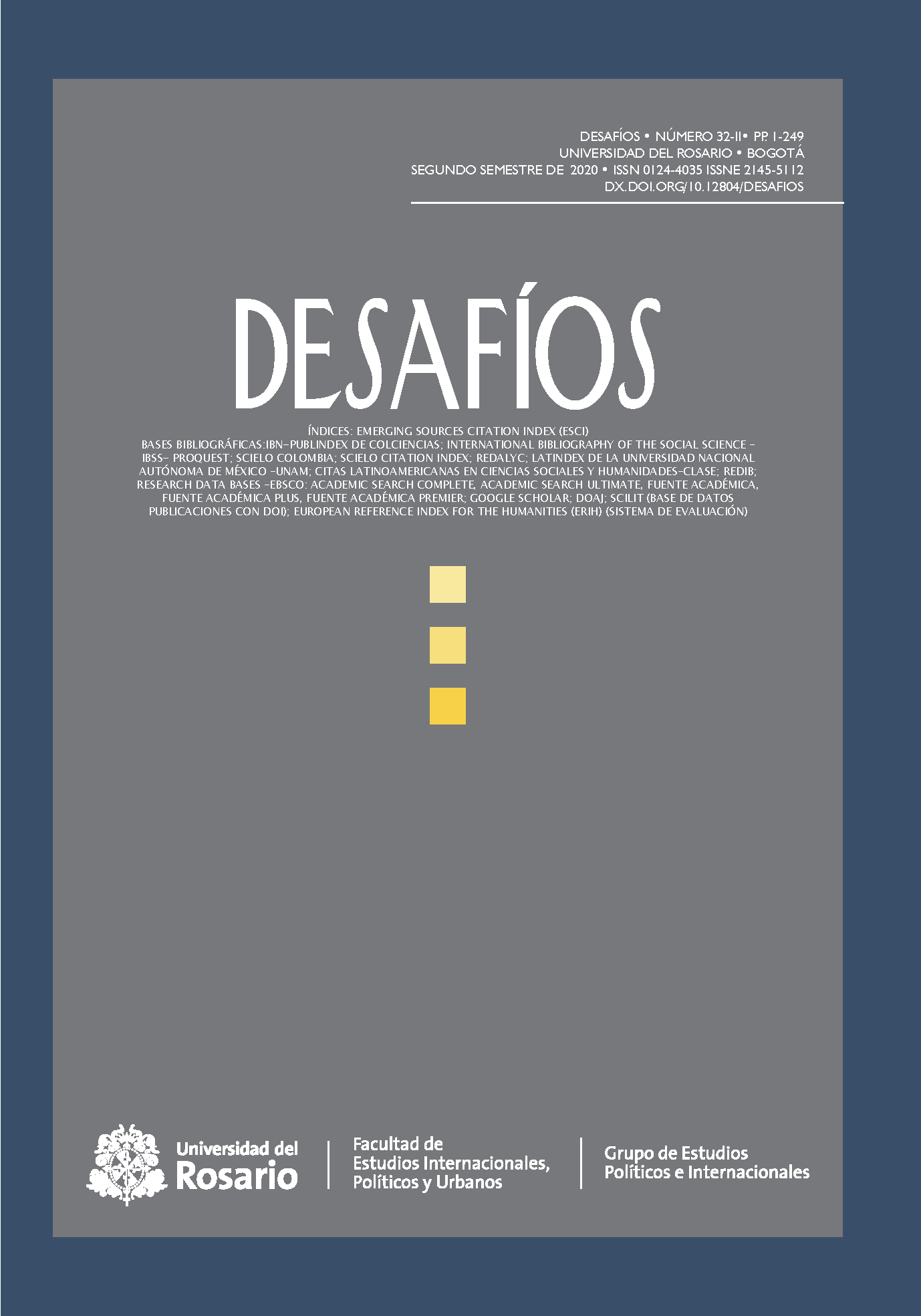La distinción entre problem-solving y teoría crítica: una reflexión desde las Relaciones Internacionales
Barra lateral del artículo
Contenido principal del artículo
En este escrito, en primer lugar, se busca determinar qué puntos de vista de determinados autores han sido asociados en las Relaciones Internacionales (RRII) con la categoría de “críticos” y por qué razones. En segundo lugar, se busca mostrar que hay diferencias no solo de matiz, sino de fondo entre los diferentes enfoques “críticos”, pero también dentro de ellos. Finalmente, se concluye explorando las razones plausibles por las cuales esta clasificación entre teorías puede ser o no de utilidad actual en las RRII, al argüir que hay un sentido en el que dicho concepto abarcador es útil, pero otro en el que promueve la confusión y las generalizaciones espurias.
Descargas
Adler, E. (2013). Constructivism in International Relations: Sources, Contributions and Debates. En W. Carlsnaes, T. Risse, & B. A. Simmons (Eds.), Handbook of International Relations (pp. 112-144). Londres: SAGE.
Ahluwalia, P. S. (2001). Politics and Post-Colonial Theory: African Inflections. Nueva York: Routledge.
Arreaza, C., & Tickner, A.B. (2002). Postmodernismo, poscolonialismo y feminismo: manual para (in)expertos. Colombia Internacional, (54), 15-38. https://doi.org/10.7440/colombiaint54.2002.01
Ashley, R. K. (1987). The Geopolitics of Geopolitical Space: Toward a Critical Social Theory of International Politics. Alternatives: Global, Local, Political, 12(4), 403-434. https://doi.org/10.1177/030437548701200401
Aylesworth, G. (2010). Postmodernism. En E. N. Zalta (Ed.), The Stanford Encyclopedia of Philosophy. http://plato.stanford.edu/archives/win2010/
entries/postmodernism/
Bhabha, H. K. (1994). The Location of Culture. Nueva York: Routledge.
Bigo, D. (2002). Security and Inmigration: toward a Critique of the Govermentality of the Unease. Alternatives: Global, Local, Political, 27(1), 63-92. https://doi.org/10.1177/03043754020270S105
Biswas, S. (2013). Postcolonialism. En T. Dunne, M. Kurki & S. Smith (Eds.), International Relations Theories: Discipline and Diversity (pp. 247-265). Oxford: Oxford University Press.
Brown, C. (2013). The Poverty of Grand Theory. European Journal of International Relations, 19(3), 483-497. https://doi.org/10.1177/1354066113494321
Campbell, D. (1998). Writing Security: United States Foreign Policy and the Politics of Identity. Minneapolis: University of Minnesota Press.
Campbell, D. (2013). “Poststructuralism”. En T. Dunne, M. Kurki & S. Smith (Eds.), International Relations Theories: Discipline and Diversity (pp. 223-246). Oxford: Oxford University Press.
Caporaso, J. A. (1979). Dependence, Dependency and Power in the Global System: A Structural and Behavioral analysis. International Organization, 32(1), 13-43.
Chakrabarty, D. (2000). Provincializing Europe. Postcolonial Thought and historical Difference. Princeton: Princeton University Press.
Cox, R. (1986). Social Forces, States and World Orders: Beyond International Relations Theory. En R. O. Keohane (Ed.), Neorealism and its Critics (pp. 204-254). New York: Columbia University Press.
Crawford, N. C. (2002). Argument and Change in World Politics: Ethics, Decolonization, and Humanitarian Intervention. Cambridge: Cambridge University Press.
Der Derian, J., & Shapiro, M. J. (1989). International/ Intertextual Relations: Postmodern Readings of World Politics (Issues in World Politics). Lexington: Lexington Books.
Devetak, R. (2012). “Vico contra Kant: the competing critical theories of Cox and Linklater”. En: S. Brincat, L. Lima & J. Nunes (Eds.), Critical Theory in International Relations and Security Studies: Interviews and Reflections (pp. 115-126). Nueva York: Routledge.
Dirks, N. B. (2004). Colonial and Postcolonial Histories: Comparative Reflections on the Legacies of Empire. Background Paper for the Human Development Report Office of the United Nations Development Programme. http://hdr.undp.org/sites/default/files/hdr2004_nicholas_dirks.pdf
Doty, R. L. (1993). Foreign Policy as Social Construction: A Post-Positivist Analysis of Counterinsurgency Policy in the Philippines. International Studies Quarterly, 37(3), 297-320. https://doi.org/10.2307/2600810
Eckersley, R. (2013). Green Theory. En T. Dunne, M. Kurki & S. Smith (Eds.), International Relations Theories: Discipline and Diversity (pp. 266-286). Oxford: Oxford University Press.
Enloe, C. (2000). Maneuvers: The International Politics of Militarizing Women’s Lives. Berkeley: University of California Press.
Flax, J. (1990). Thinking Fragments. Psychoanalysis, Feminism, and Postmodernism in the Contemporary West. Nueva York: Routledge.
Foucault, M. (1979). Power, Truth, strategy. Sídney: Feral Publications.
Foucault, M. (1998). El sujeto y el poder. Texto y contexto, (35), 7-24.
George, J., & Campbell, D. (1990). Patterns of Dissent and the Celebration of Difference: Critical Social Theory and International Relations. International Studies Quarterly, 34(3), 269-293.
Germain, R. D., & Kenny, M. (1998). Engaging Gramsci: International Relations Theory and the New Gramscians. Review of International Studies, 24(1), 3-21.
Grasswick, H. (2008). Feminist Social Epistemology. En E. N. Zalta (Ed.), The Stanford Encyclopedia of Philosophy. http://plato.stanford.edu/archives/fall2008/entries/feminist-social-epistemology
Grovogui, S. N. (2006). Beyond Eurocentrism and Anarchy: Memories of International Order and Institutions. Houndsmills: Palgrave Macmillan.
Habermas, J. (1968). Erkenntnis und Interesse. Frankfurt: Suhrkamp Verlag.
Habermas, J. (1984, 1987). The Theory of Communicative Action. Boston: Beacon Press.
Habermas, J. (1985). Der Philosophische Diskurs der Moderne. Frankfurt: Suhrkamp Verlag.
Hacker, P.M.S. (2005). Analytic Philosophy: beyond the linguistic turn and back again. http://info.sjc.ox.ac.uk/scr/hacker/docs/Beyondthelinguistic turn.pdf.
Hall, S. (1996). When was “the postcolonial”? Thinking at the limit? En I. Chambers & L. Curti (Eds.), The Post-colonial Question. Common Skies, Divided Horizons (pp. 242-260). Nueva York: Routledge.
Harding, S. (2000). Gender, Development, and Post-Enlightenment Philosophies of Science. En U. Narayan & S. Harding (Eds.), Decentering the Center. Philosophy for a Multicultural, Postcolonial, and Feminist World (pp. 240-265). Bloomington: Indiana University Press.
Harding, S. (2004). A socially relevant philosophy of science? Resources from Standpoint Theory’s Controversiality. Hipatya 9(1), 25-47.
Held, D., & McGrew, A. (Eds.) (2003). The Global Transformations Reader. Cambridge: Polity Press.
Hoffman, M. (1987). Critical Theory and the Inter-Paradigm Debate. Millennium: Journal of International Studies, 23(1), 109-18.
Horkheimer, M. (1982). Critical Theory. Nueva York: Seabury Press.
Hurrell, A. (2013). Norms and Ethics in International Relations. En W. Carlsnaes, T. Risse & B. A. Simmons, (Eds.), Handbook of International Relations (pp. 57-84). Londres: SAGE.
Inayatullah, N., & Blaney, D. L. (2004). International Relations and the Problem of Difference. Nueva York, London: Routledge.
Korab-Karpowicz, W. J. (2013). Political Realism in International Relations. En E. N. Zalta (Ed.), The Stanford Encyclopedia of Philosophy. http://plato.stanford.edu/archives/sum2013/entries/realism-intl-relations/
Kratochwil, F. (2007). Looking Back from Somewhere: Reflections on What Remains “Critical” in Critical Theory. Review of International Studies, 33(S1), 25-45. https://doi.org/10.1017/S0260210507007383
Kurki, M., & Wight, C. (2013). International Relations and Social Science. En T. Dunne, M. Kurki & S. Smith (Eds.), International Relations Theories: Discipline and Diversity (pp. 14-35). Oxford: Oxford University Press.
Lacher, H. (2006). Beyond Globalization: Capitalism, Territoriality and the International Relations of Modernity. Londres: Routledge.
Lake, D. A. (2013). Theory is dead, long live theory: The end of the Great Debates and the rise of eclecticism in International Relations. European Journal of International Relations,19(3), 567-587. https://www.doi.org/10.1177/1354066113494330
Lapid, Y. (1989). The Third Debate: On the Prospects of International Theory in a Post-positivist Era. International Studies Quarterly, 33(3), 235-254. https://www.doi.org/10.2307/2600457
Leysens, A. (2008). The Critical Theory of Robert Cox. Fugitive or Guru? Hampshire: Palgrave Macmillan.
Linklater, A. (1990). Beyond Realism and Marxism: Critical Theory and International Relations. Basingstoke: Macmillan Press.
Linklater, A. (2001). The Changing Contours of Critical International Relations Theory. En R. Wyn Jones (Ed.), Critical Theory and World Politics (pp. 23-43). Boulder: Lynne Rienner.
Onuf, N. (1989). World of Our Making: Rules and Rule in Social Theory and International Relations. Columbia, SC: University of South Carolina Press.
Peterson, V. S., & True, J. (1998). “New Times” and New Conversations. En M. Zalewki & J. Parpart, (Eds.), The “Man” Question in International Relations (pp. 14-27). Boulder: Westview Press.
Rengger, N. J., & Thirkell-White, B. (2007). Still Critical after All These Years? The Past, the Present and the Future of Critical Theory in International Relations. Review of International Studies, 33(1), 3-24.
Roach, S. (2008). Critical Theory and International Relations. A reader. Nueva York: Routledge.
Roach, S. (2013). Critical Theory. En T. Dunne, M. Kurki & S. Smith (Eds.), International Relations Theories: Discipline and Diversity (pp. 171-186). Oxford: Oxford University Press.
Robinson, F. (1999). Globalising Care: Ethics, Feminist Theory and International Relations. Oxford: Westview Press.
Rupert, M. (2013). Marxism. En T. Dunne, M. Kurki & S. Smith (Eds.), International Relations Theory: Discipline and Diversity (pp. 153-170). Oxford:Oxford University Press.
Said, E. (2004). Orientalismo. Barcelona: Random House Mondadori.
Smith, S. (1995). The Self-Images of a Discipline: A Genealogy of International Relations Theory. En K. Booth & S. Smith (Eds.), International Relations Theory Today (pp. 1-37). Cambridge: Polity Press.
Spivak, G. C. (1988). Can the subaltern speak? En C. Nelson & L. Grossberg (Eds.), Marxism and the Interpretation of Culture (pp. 271-313). Basingstoke: Macmillan Press.
Sterling-Folker, J. (2015). All Hail to the Chief: Liberal IR Theory in the New World Order. International Studies Perspectives 16(1), 40-49. https://doi.org/10.1111/insp.12089
Tickner, J. A. (1992). Gender in International Relations. Feminism Perspectives on Achieving Global Security. Nueva York: Columbia University Press.
Tickner, J. A., & Sjoberg, L. (2013). “Feminism”. En T. Dunne, M. Kurki & S. Smith (Eds.), International Relations Theories: Discipline and Diversity (pp. 205-222). Oxford: Oxford University Press.
Tickner, A. B., & Wæver, O. (Eds.). (2009). International Relations Scholarship around the World. Londres: Routledge.
Wæaver, O. (1996). The Rise and Fall of the inter-paradigm debate. En S. Smith, K. Booth & M. Zalewski (Comps.), International Theory: Positivism and Beyond (pp. 149-185). Cambridge: Cambridge University Press.
Wæaver, O. (2012). Aberystwyth, Paris, Copenhagen. The Europeanness of New “Schools” of Security Theory in an American Field. En A. B. Tickner & D. L. Blaney (Eds.), Thinking International Relations Differently (pp. 48-71). Londres: Routledge.
Walker, R. B. J. (1993). Inside/Outside: International Relations as Political Theory. Cambridge: Cambridge University Press.
Wallerstein, I. (2002). Un mundo incierto. Buenos Aires: Libros del Zorzal. Winch, P. (1958). The idea of a Social Science. Londres: Routledge & Kegan Paul.
Wyn Jones, R. (1999). Security, Strategy, and Critical Theory. Boulder, CO: Lynne-Rienner Publishers.
Zehfuss, M. (2013). Critical Theory, Poststructuralism and Postcolonialism. En W. Carlsnaes, T. Risse & B. A. Simmons, B. A. (Eds.), Handbook of International Relations (pp. 145-169). Londres: SAGE.
Detalles del artículo

Esta obra está bajo una licencia internacional Creative Commons Atribución-NoComercial-SinDerivadas 4.0.
Los derechos de autor serán de la Universidad del Rosario. Cuando el autor quiera publicar el manuscrito en otra publicación, deberá pedir a la Editorial de la Universidad del Rosario los permisos correspondientes. De igual forma, cuando la Revista esté interesada en publicar artículos que ya han sido publicados en otras revistas, procederá a solicitar los permisos correspondientes en la editorial donde se realizó la primera publicación. Bajo una Creative Commons Attribution License, los autores pueden compartir el trabajo con un reconocimiento de la autoría del trabajo y la publicación inicial en esta revista.Artículos más leídos del mismo autor/a
- Gabriel Jiménez-Peña, Ralf J. Leiteritz, Carolina Urrego-Sandobal, Dossier “Estado del arte de la Economía Política Internacional en Latinoamérica” , Desafíos: Vol. 30 Núm. 2 (2018): (julio-diciembre) Estado del arte de la Economía Política Internacional en Latinoamérica
- Gabriel Jiménez-Peña, Presentación dossier temático: “Procesos de regionalización”: nuevos y antiguos regionalismos , Desafíos: Vol. 30 Núm. 1 (2018): (enero-junio) Procesos de regionalización: nuevas y antiguas perspectivas
- Gabriel Jiménez-Peña, Rixen, Thomas; Lora Anne Viola; Michael Zürn. Historical Institutionalism and International Relations. Explaining Institutional Development in World Politics. Oxford: Oxford University Press. 2016. 229 p. , Desafíos: Vol. 30 Núm. 1 (2018): (enero-junio) Procesos de regionalización: nuevas y antiguas perspectivas




